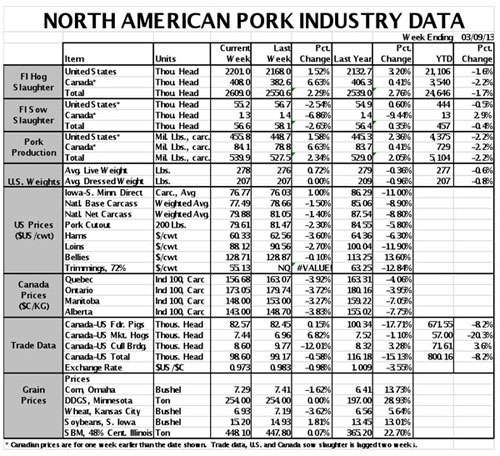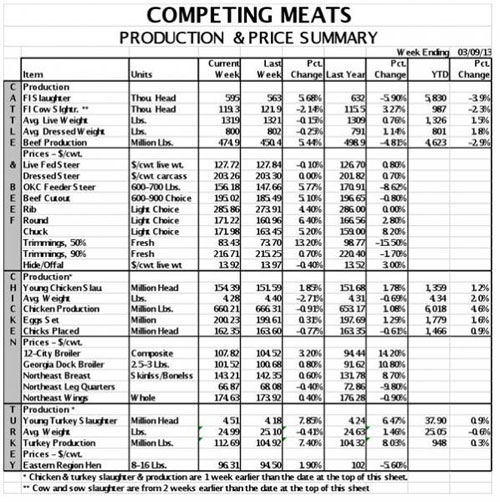



COOL Controversy Far From Over
US - That huge THUD you heard coming from somewhere up north on Friday afternoon was the collective sound of a few thousand Canadian chins hitting the desktop, lap or floor upon seeing the US Department of Agriculture’s proposed rule to fix mandatory country-of-origin labeling (MCOOL), writes Steve Meyer in his latest "Market Preview" as published in National Hog Farmer magazine.To say that the proposed solution to this problem was not what our Canadian friends had in mind when they appealed the program to the World Trade Organization (WTO) is a gross, gross understatement. Far from eliminating MCOOL, USDA has in my opinion very likely made it more onerous.
First, let’s have a bit of review. Canada and Mexico (along with several other countries) filed an objection with the WTO alleging that the US MCOOL program was a violation of the trade agreements between the three countries. The WTO ruled in favor of the complainants and the United States appealed that decision. The WTO denied that appeal and again ruled that MCOOL violated trade agreements, giving the United States until May 23 to change MCOOL or be subject to trade retaliation by Canada and Mexico. That retaliation could be levied against a wide variety of products but most assume (correctly, I believe) that US agricultural products – and especially US beef and pork – would be high on the retaliation list.
But the WTO appellate decision contained some curious findings that have left resolution of the situation up in the air. The 29 June 2012 WTO report (which can be found here) stated that:
- The review panel was correct in stating that the COOL measure treats imported livestock differently than domestic livestock.
- The review panel was correct in finding that the COOL measure modifies condition of competition in the US market to the detriment of imported livestock by creating an incentive in favor of processing exclusively domestic livestock and a disincentive against handling imported livestock.
- The review panel fulfilled its obligation to make an objective assessment of the facts in its findings regarding segregation, commingling and the price differential between imported and domestic livestock in US markets.
- The Appellate Body upheld the review panel’s finding that the COOL measure, particularly in regard to the muscle cut meat labels, is inconsistent with trade agreements because it accords less favorable treatment to imported livestock than to like domestic livestock.
The same report, though, points out that some facets of country-of-origin labeling are acceptable. Specifically, it says
- The review panel did not err in finding that the objective of the COOL measure is providing origin information to consumers.
- The review panel, in identifying the objective, fulfilled its obligation to objectively assess the facts and did not fail to characterize the objective in sufficient detail.
- The review panel did not err in finding that providing consumer information on origin is a legitimate objective within the trade rules.
- The review panel erred in finding that "the COOL measure does not fulfill the identified objective because it fails to convey meaningful origin information to consumers."
- The Appellate Body cannot complete an analysis of whether the COOL measure is more trade restrictive than necessary to fulfill its legitimate objective due to the lack of sufficient undisputed facts or factual findings.
I’m no lawyer but I think the first set of bullet points says that the WTO panel correctly looked at the facts in determining that a) MCOOL treats imported animals differently, b) MCOOL changes competitive conditions to the detriment of imported animals by creating a favorable incentive to process domestic animals and c) MCOOL is inconsistent with trade agreements because it affords less favorable treatment to imported livestock.
The second set of bullet points says, though, that a) the objective of MCOOL is to provide information and the Appellate Body did, in fact, consider all of the facts in making that determination, b) providing consumer information on origin is a legitimate objective, c) it is incorrect to conclude that MCOOL does not fulfill its objectives due to not conveying meaningful origin information and d) WTO doesn’t have enough facts to conclude whether MCOOL is more restrictive than necessary to fulfill the objective.
So USDA’s Agricultural Marketing Service decided to fix the problem by dropping the rules that allowed product from animals born in Canada and Mexico but fed and processed in the United States to be mixed with product from domestically-born animals under a "Product of the US and Country X" label. The new rule says labels must contain information regarding where each step of the process occurs. So now the product from animals born in Canada, fed in the United States and slaughtered in the United States will carry a label stating as such. Product from strictly domestic animals will no longer be labeled "Product of the United States" but will say "Born, raised and slaughtered in the United States."
Do these changes solve the problems identified by the WTO? Do they address the issue that any kind of country-of-origin labeling creates significant segregation costs even if origin labeling is itself a legitimate goal? You can probably tell from my questions that I doubt that either question can be answered affirmatively. Canada and Mexico will say the same thing when they appeal to the WTO that the USDA “fix” is really no fix at all but just a ploy to a) appease protectionist US farm groups and b) set the stage for more negotiations, probably as part of the Trans-Pacific Partnership process. This issue is FAR from settled.










